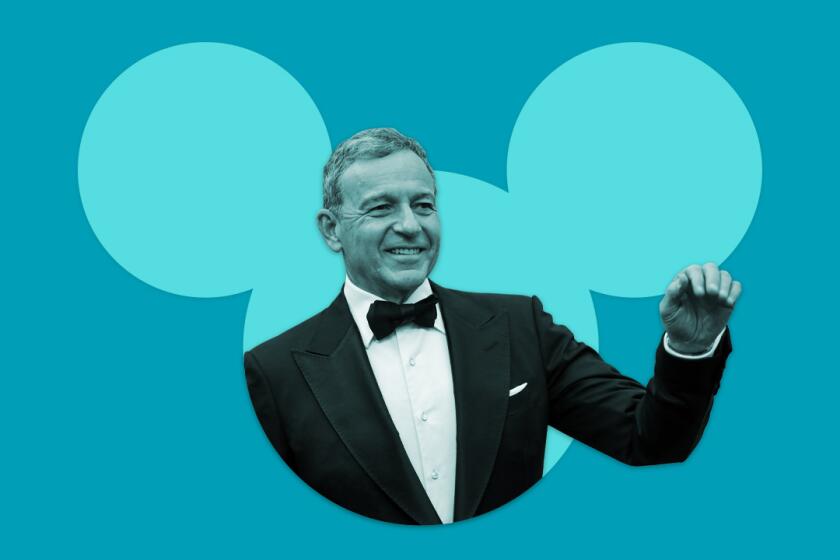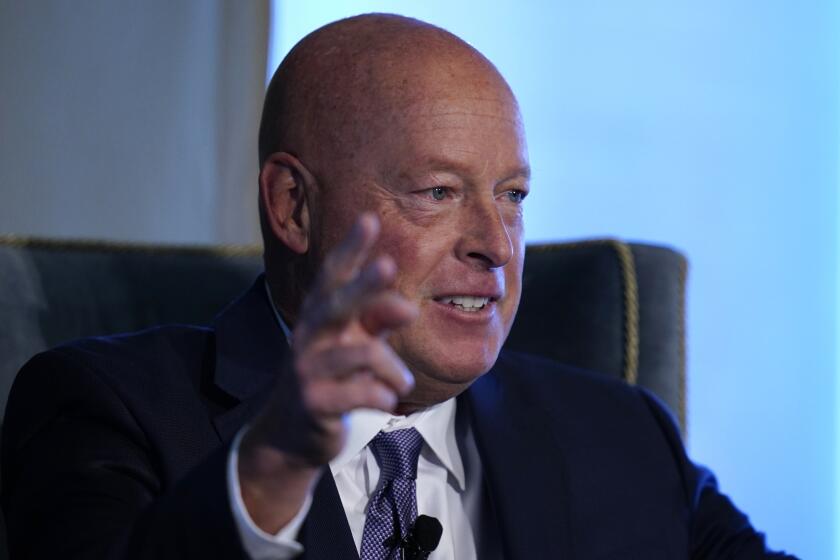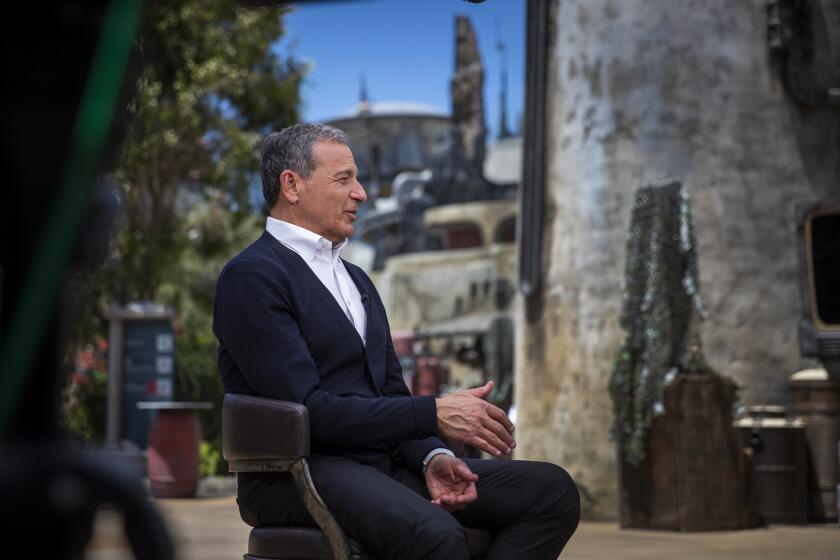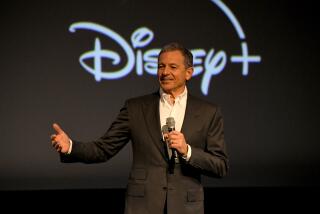Commentary: Bob Iger and the inevitability of the comeback
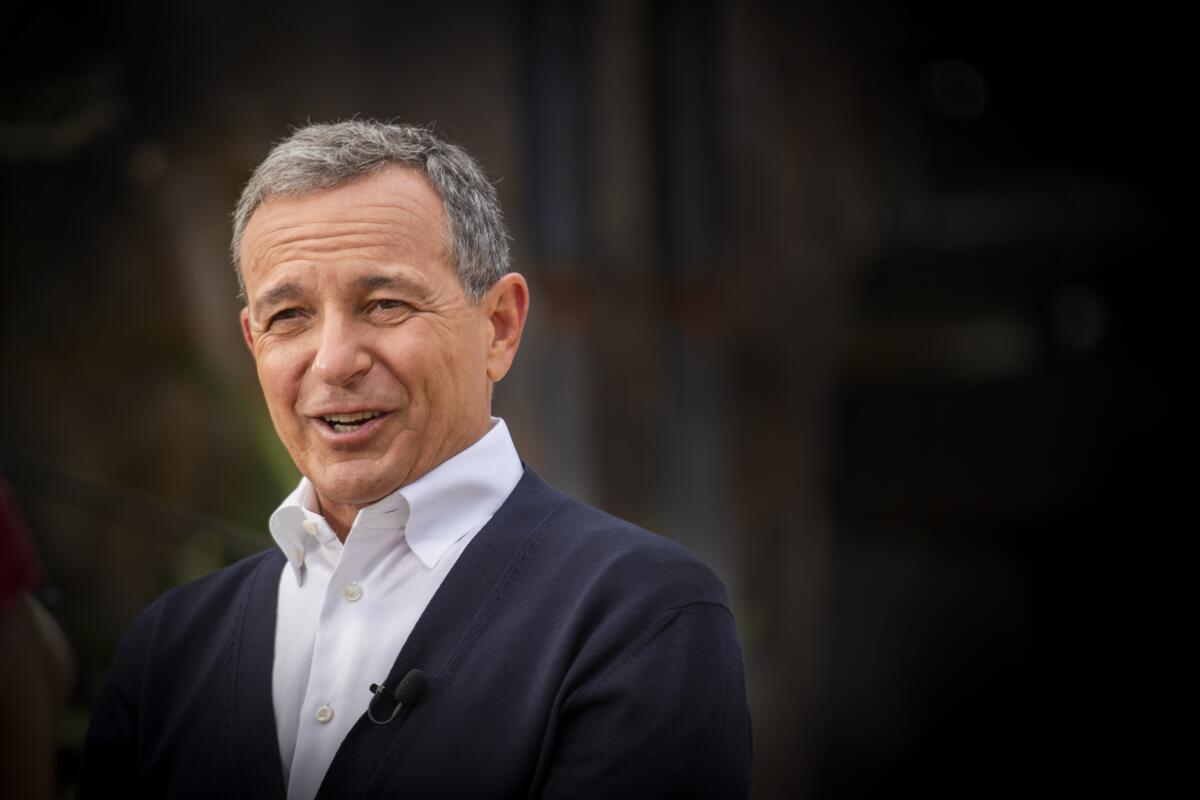
- Share via
One of the basic economic arguments for why CEO pay needs to be monarchically high is that the talent pool for would-be saviors is a millimeter deep. After all, on paper anyway, the only people qualified to run a world-spanning entertainment company are the ones who have already done it. This is the part of the American corporate feedback loop where meritocracy begets dynasty, in which Iger begets Iger.
Reinstalled as CEO after a palace coup inside Cinderella Castle over the weekend, Bob Iger, who ran the Walt Disney Co. for 15 years until leaving in 2020, is already sweeping away the trappings of his successor, Bob Chapek. After just one day on the job, Iger dismissed one of Chapek’s top lieutenants, Kareem Daniel, and announced plans to unwind a Chapek reorganization that had alienated creative heads. “It is my intention to restructure things in a way that honors and respects creativity as the heart and soul of who we are,” Iger wrote employees.
The sighs of relief were practically audible, and Disney’s stock jumped 6.3% after the change in command. The Iger restoration has an escape-from-Elba cast to it, in which even stupefied competitors have to acknowledge the great conqueror’s reappearance. “Ugh,” Netflix CEO Reed Hastings tweeted. “I had been hoping Iger would run for President. He is amazing.”
Iger left Disney when it was about to get clobbered by the pandemic. Can he pick up the pieces?
Although Iger’s return shocked Hollywood watchers when the news first landed — as recently as two months ago, Iger was saying he didn’t miss running Disney — the decision already seems inevitable in retrospect.
Iger had built Disney into a behemoth during his reign, gobbling up Pixar, Marvel Entertainment, Lucasfilm and 21st Century Fox to add to the company’s treasure pile of ESPN, ABC and its theme park business. Disney watchers had marveled at many of these deals. Yet Iger’s biggest responsibility as a leader was to find a successor who could master the world he created, and he failed. Thus it is written that the great builder Iger created even the sorry conditions requiring his return.
Insiders said trouble had been brewing around Chapek, 62, since he took over in February 2020 and was buffeted by forces far greater than himself.
Disney’s board gave Bob Chapek a three-year contract extension in June. Five months later, the board replaced him with predecessor Bob Iger. What happened?
There was the global COVID-19 pandemic and the accompanying lockdowns that upended American business, turning Disney’s packed theme parks into potential pathogenic kill zones. Then Disney got squeezed between the political movements of social progressivism and right-wing reaction in Florida, where Chapek drew fire from both progressives and Republican Gov. Ron DeSantis over the company’s position on the so-called “Don’t Say Gay” law in state schools.
The pivot to streaming has been an especially troublesome one, with the whole industry facing a crunch as cord-cutting from traditional moneymakers like TV and cable accelerates. Investors were stunned earlier this year when Netflix lost subscribers for the first time in more than a decade; maybe there wasn’t as much profit in the business to be had as originally thought. In the last financial quarter, Paramount, Peacock and Warner Bros. Discovery each lost hundreds of millions of dollars spending to grow their streaming audiences; Disney’s own direct-to-consumer division, which includes Disney+, Hulu and ESPN+, lost $1.5 billion.
In one of the more head-turning episodes, Disney’s streaming pivot instigated a highly public scrape with Scarlett Johansson after Disney co-released “Black Widow” in theaters and on Disney+, potentially cutting Johansson’s pay, which was tied to box office performance. Chapek said the company was trying to navigate a COVID-era entertainment environment with artist contracts that had been negotiated years earlier — during Iger’s reign.
All this, and with a broader economic slowdown looming as the Federal Reserve tries to slam the door on inflation. That’s a lot for any leader to deal with, not just Chapek — and then there’s the fact that there’s little more dangerous to a new CEO’s longevity than to have a respected predecessor lingering around in the parking lot.
Walt Disney Co. ousted Bob Chapek and brought back Bob Iger to run the Burbank-based company, sending shockwaves through the industry.
Iger himself had delayed retirement as CEO for years, and he remained on Disney’s board even after handing off the reins to Chapek. Iger’s presence there as executive chairman through last December reportedly irritated Chapek, perhaps not irrationally so. One business study found that a CEO is 40% more likely to get fired when a predecessor is sitting on the board; more than 10% of the companies analyzed for the study rehired the old CEO. Even old bosses can have lean and hungry looks. (So-called boomerang CEOs, however, have mixed records.)
But with recession looming and political uncertainty continuing to frack the country’s state of mind, it’s definitely been comeback season lately, and not just at Disney.
Donald Trump, 76, in one of the least surprising political developments of the last two years, has announced his plans to run for president again after voters narrowly hurled him out of the White House in 2020. The man Trump is trying to replace, Joe Biden, 80, is himself a throwback figure from the Obama years, whose age Democratic voters were willing to overlook because he represented stability.
Iger has already taken steps to undo some of the organizational changes made by his predecessor, but his return to the company comes with many challenges.
In the business world, one of America’s largest consumer chains, Starbucks, whose feel-good corporate image has gotten debunked by its workers’ unionization drive, resummoned Howard Schultz this spring for a third stint as CEO. Even at Elon Musk’s turbulent Twitter, the only real changes users can encounter so far are the restoration of long-familiar accounts for figures like Trump and Kanye West, who’d been banned after the previous ownership tired of their inflammatory antics.
Marx once wrote that great personages and events appear twice in history: the first time as tragedy, the second time as farce. His predecessor Hegel had a slightly different take: the first time was chance, the second time destiny. Hopefully somewhere in this parade of rerun CEOs and exhaustively exploited and re-exploited IP, somebody does something new. But given that the top 10 grossing movies of 2022 so far are all sequels or derivatives of existing characters, we seem stuck with what we’ve already got. Hope you like it. It feels like destiny.
More to Read
The biggest entertainment stories
Get our big stories about Hollywood, film, television, music, arts, culture and more right in your inbox as soon as they publish.
You may occasionally receive promotional content from the Los Angeles Times.
